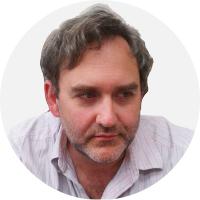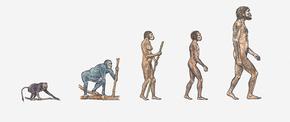The views expressed in our content reflect individual perspectives and do not represent the authoritative views of the Baha'i Faith.
In a fascinating passage from a talk he gave in 1912 at Columbia University in New York City, Abdu’l-Baha discussed how the ability to predict the future represents a kind of superpower of science.
In his talk, he appeared to link that scientific ability to the prophetic power of the prophets and former sages:
Science may be likened to a mirror wherein the images of the mysteries of outer phenomena are reflected. It brings forth and exhibits to us in the arena of knowledge all the product of the past. It links together past and present. The philosophical conclusions of bygone centuries, the teachings of the prophets and wisdom of former sages are crystallized and reproduced in the scientific advancement of today. Science is the discoverer of the past. From its premises of past and present we deduce conclusions as to the future.
RELATED: Religion, Science and Reason: The Dynamic Relationships
Abdu’l-Baha said something quite similar in his talk a few days later to the Bethel Literary Society of the Metropolitan African Methodist Episcopal Church in Washington, D.C.:
Through intellectual and intelligent inquiry science is the discoverer of all things. It unites present and past, reveals the history of bygone nations and events, and confers upon man today the essence of all human knowledge and attainment throughout the ages. By intellectual processes and logical deductions of reason this superpower in man can penetrate the mysteries of the future and anticipate its happenings.
So in this essay, let’s consider evidence and examples of how that “superpower” ability to predict the future or have knowledge about a system permits the development of order in that system.
Several researchers have suggested that the ability to predict future events might be linked to the very processes of life and evolution and even perhaps the emergence of mind. More technically, this capacity to “mirror” or predict is quantified using what Claud Shannon, the author of information theory, called mutual information or the related concept in mathematical statistics, known as Fisher Information.
Both of these metrics encapsulate the capacity to “mirror” or predict. Simply stated, both Shannon and Fisher Information quantify how much a given piece of information relates to another. So, for example, your watch has an amount of mutual or Fisher Information relative to the Earth/sun orbit. Thus, your watch can be used to predict when the sun will rise and set tomorrow.
The evolutionary biologist Steven A. Frank, writing in The Journal of Evolutionary Biology in 2009, proposed that the process of natural selection maximizes Fisher Information resident in the genome.
In the simplest terms, this means that the process of evolution attempts to correctly predict future conditions and maximize the future outcomes for any progeny.
A similar idea was echoed by Christoph Adami, a professor of Microbiology and Molecular Genetics, as well as professor of Physics and Astronomy, at Michigan State University. In his 2016 article “What is Information?” Adami proposed a new definition of information as “anything, which can give one the ability to predict an outcome better than chance.” He goes on to calculate that ability using Shannon’s mutual information. They both argue that this sort of predictive information appears to be central to the process of evolution.
Shannon’s mutual information has more recently been applied to neurological models to address the question of mental causation or “will.” In a 2017 Entropy article entitled “When the Map Is Better Than the Territory” Eric Hoel argued that the development of what he terms “Effective Information” is what quantifies the development of “mental causation.”
“Effective Information” essentially quantifies how much the knowledge of each state in a multi-state state system such as a set of neurons, when combined in some manner reduces the uncertainty about the future of that system and is calculated using mutual information. Hoel’s paper claims that this re-scaled information acquires predictive abilities which exceed that of the individual parts for certain systems. Casting causal structure as a type of communication channel, he proves that the macro scale can possess more “effective Information” than the micro-scale and thus more causal power. Here causal power is gained via a process identical to how reliable information can be transmitted over a noisy channel, using error correcting codes. He shows how the acquisition of predictive power for a given collective network is what bestows agency to that system.
Thus, again we see how predictive information might be also linked to the very emergence of consciousness.
One of the key parts of developing predictive information involves the process of measurement. For it is only from some initial measured state that one can use a mathematical model to make predictions. I would even venture to claim that measurement is also a necessary part of the creative act embodied in the generation of information and order.
RELATED: Life, Matter and the God Particle
This idea might be reflected in Baha’u’llah’s commentary on the Bism Allah of the Qur’an: “In the name of God, the Most Gracious, the Most Merciful.” This phrase precedes each surah or chapter of the Qur’an, with the exception of the ninth. Baha’u’llah discusses the esoteric meanings of the point which is used to construct the Arabic letter b in the Bism Allah (بِسْمِ ٱللَّٰهِ, “In the name of God”) part of the phrase. Based on a provisional translation by Stephen Lambden, Baha’u’llah links it to the differentiation of past and future knowledge and relates this act of differentiation to the process of creation itself:
Praised be to God Who made the Point to be outstretched within the Book of Origination, an Ornament through which is the Genesis of Creativity. From it He differentiated the knowledge of what hath been and what will come to pass.
The formation of past knowledge as memories or measurements means that all future knowledge involves prediction. This verse has curious echoes of Abdu’l-Baha’s discussion of science and its linking “together past and present.” This resonates deeply with the scientific conclusion that predictive information seems to be involved in the emergence of order and the process of evolution.
In the next series of essays, we will explore how this capacity to “mirror” or “predict” is also described by the concept of semantics and meaning – which at their core describe how symbols can carry information relative to something else. At the same time, we’ll explore the study of semantics, which represents a big part of philosophy in the study of linguistics and semiotics, and relates to the questions of the Enlightenment which have dominated modern philosophy.

















Comments
Sign in or create an account
Continue with Facebookor